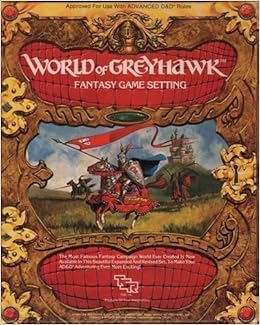 Palladium Books is one of the old-timers in the tabletop RPG world. I've made several posts touching upon this mad old-timer and his games before, and I've had a love-hate relationship with the company for decades now. The games are fun, but organized as if by meth heads needing a fix, and often need spot-rulings to clarify what should've been crystal clear from the get-go. However, the man behind the company has issues sufficient to open a comic shop; I don't like buying new if I can help it, save for X-Mas Grab Bags.
Palladium Books is one of the old-timers in the tabletop RPG world. I've made several posts touching upon this mad old-timer and his games before, and I've had a love-hate relationship with the company for decades now. The games are fun, but organized as if by meth heads needing a fix, and often need spot-rulings to clarify what should've been crystal clear from the get-go. However, the man behind the company has issues sufficient to open a comic shop; I don't like buying new if I can help it, save for X-Mas Grab Bags.
Everyone likes to talk about RIFTS, but if you really want to get at the heart of Palladium's aesthetic you need to look at the older stuff. For science fiction, it's the Mechanoid Trilogy and its totally-not-the-Daleks. For fantasy, it's Palladium's eponymous RPG that you ought to take the time to look at. The blend of those two games, flavored with elements from their other RPGs such as Heroes Unlimited, Teenage Mutant Ninja Turtles & Other Strangeness (now After The Bomb), Robotech, and Beyond the Supernatural are what makes RIFTS what it is.
You can't see it as well in the current (second) edition of the fantasy game, but you can see how this game emerged from a series of tinkerings and other house rulings made to Dungeons & Dragons. But you don't enjoy a Palladium game for its rules or its mechanics. You enjoy it for the sincerity and earnest qualities of its setting and supporting supplements, because man does this ling has some gems in it that make the more mediocre parts seem greater than they are. The Wolfen Empire being Rome-as-Wolves is brilliant, especially if you actually know Roman mythology and have some familiarity with its history.
You'll find little things like that all over the game. The "Warlock" class is actually elemental-themed theurgy, almost shamanistic. (Whereas the actual Shaman is lame.) The Druid class feels more like a Celt druid. Longbowmen are a separate class, and only Rangers otherwise can even use longbows proficiently. Magic use is split by discipline into separate classes. Little things like that, which are just enough to snare and hold your attention if you're willing to tinker a bit to bring out the full potential.
In short, Palladium's games work because (as much by design as by accident) the games sit so that it makes great (if not excellent) use of liminal space to allow the players to make the game work to fullest effect. You need the brainmeats of the players (including the Game Master) to fill the void that today's Mech Pilots demand be filled with mechanics lubricated by Pink Slime genre elements. I keep up a collection of Palladium games for that reason. Enjoy a Palladium game if you can.

 It should be no surprise that, having played AD&D 1st Edition back int the day, the other kids and I also got into Greyhawk. So I got out my 1st edition booklets and maps again to look that over with mature eyes recently also.
It should be no surprise that, having played AD&D 1st Edition back int the day, the other kids and I also got into Greyhawk. So I got out my 1st edition booklets and maps again to look that over with mature eyes recently also.